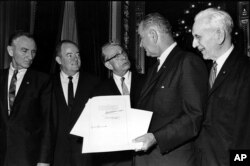A milestone in American history is being remembered this week as the nation marks the 50th anniversary of the signing of the 1964 Civil Rights Act (July 2, 1964). The landmark federal legislation outlawed racial discrimination and ended segregation in schools, the workplace and at public accommodations.
In 1963, Civil rights demonstrations in the U.S. south turned violent. President John Kennedy called the situation "a moral crisis".
"This is not a sectional issue. Difficulties over segregation and discrimination exist in every city, in every state in the union, producing in many cities a rising tide of discontent that threatens the public safety," Kennedy said.
Historical meeting
President Kennedy met civil rights leader Martin Luther King to discuss ending the demonstrations. The meeting was arranged by Kennedy advisor, Harris Wofford.
"Martin Luther King deliberately said part of what non-violent direct action does is it creates crisis that people in power, whether it is government or corporations or others, they have to listen to," said Wofford.
President Kennedy responded in a nationally televised address.
"In too many communities in too many parts of the country wrongs are inflicted on Negro citizens and there are no remedies of law. Unless the Congress acts, their only remedy is the street. I am therefore asking the Congress to enact legislation giving all Americans the right to be served in facilities that are open to the public," he said.
The Civil Rights Act outlaws racial segregation in schools, the workplace and at public accommodations such as restaurants. The legislation faced strong opposition from mostly white southern lawmakers who tried to block its passage.
Right conditions
Harris Wofford said the ongoing demonstrations and President Kennedy's assassination created the conditions for passing the Civil Rights Act.
"I don't think it would have necessarily have passed if he [President Kennedy] had not been killed and a wave of sympathy and understanding sweep the majority of the people in the United States," he said.
July 1964, President Lyndon Johnson signed the Civil Rights Act into law. Former Congressman Ron Dellums said it is a crowning achievement for so many African Americans.
"The Civil Rights Act was a very significant event in American history. I maintain it was a time when the people in this country actually bent the political process to their will," said Dellums.
Reaping the benefits
Five decades later, Jack Jones reaps the benefits of the anti-discrimination laws. He grew up in the segregated south and was denied opportunities, but went on to run a small nationwide company.
"I have absolutely no doubt that the Civil Rights Act changed America. It changed for all of us, it changed mostly for us, the black people, but it also sought out to make this country a better country," he said.
Activists say the support of so many who demonstrated for freedom and justice in the 1960s helped make the Civil Rights Act a reality and a cornerstone of racial justice.








